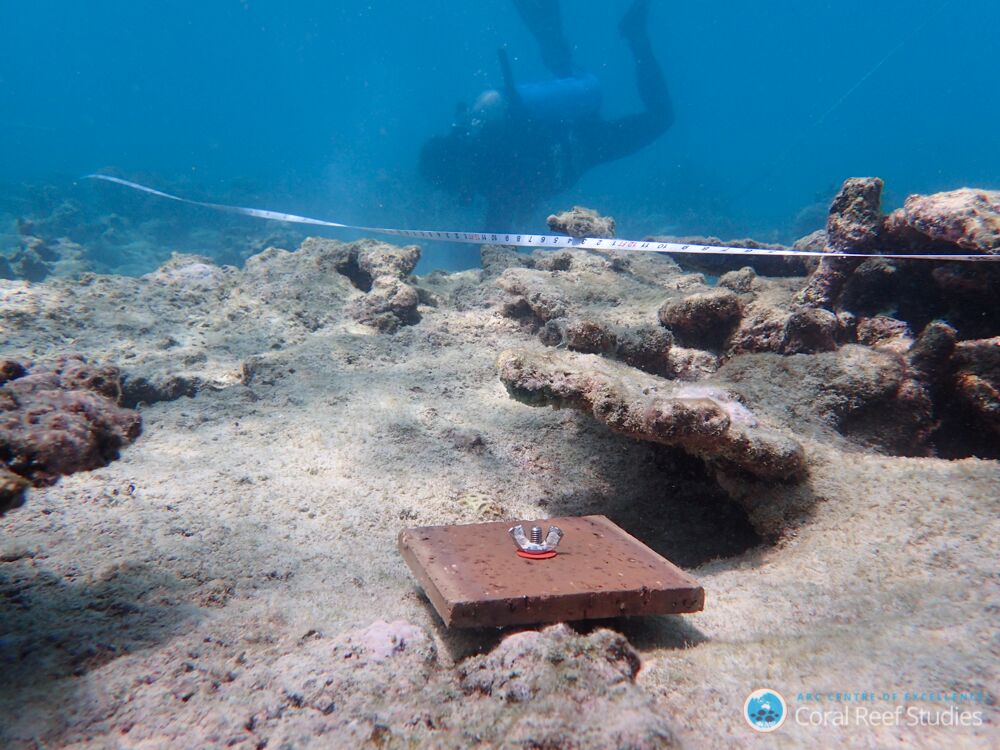Coral larvae production drops by 90 percent after marine heat waves – “We used to think that the Great Barrier Reef was too big to fail – until now”

4 April 2019 (James Cook University) – The damage caused to the Great Barrier Reef by global warming has compromised the capacity of its corals to recover, according to new research published today in Nature.
“Dead corals don’t make babies,” said lead author Professor Terry Hughes, Director of the ARC Centre of Excellence for Coral Reef Studies at James Cook University (JCU). “The number of new corals settling on the Great Barrier Reef declined by 89 percent following the unprecedented loss of adult corals from global warming in 2016 and 2017.”
The unique study measured how many adult corals survived along the length of the world’s largest reef system following extreme heat stress, and how many new corals they produced to replenish the Great Barrier Reef in 2018. The loss of adults resulted in a crash in coral replenishment compared to levels measured in previous years before mass coral bleaching.
“The number of coral larvae that are produced each year, and where they travel to before settling on a reef, are vital components of the resilience of the Great Barrier Reef. Our study shows that reef resilience is now severely compromised by global warming,” said co-author Professor Andrew Baird.
“The biggest decline in replenishment, a 93% drop compared to previous years, occurred in the dominant branching and table coral, Acropora. As adults these corals provide most of the three-dimensional coral habitat that support thousands of other species,” he said.
“The mix of baby coral species has shifted, and that in turn will affect the future mix of adults, as a slower than normal recovery unfolds over the next decade or longer.”
“The decline in coral recruitment matches the extent of mortality of the adult brood stock in different parts of the Reef,” added Professor Hughes. “Areas that lost the most corals had the greatest declines in replenishment.”
“We expect coral recruitment will gradually recover over the next five to ten years, as surviving corals grow and more of them reach sexual maturity, assuming of course that we don’t see another mass bleaching event in the coming decade,” he said.
So far, the Great Barrier Reef has experienced four mass bleaching events due to global warming, in 1998, 2002, and back-to-back in 2016 and 2017. Scientists predict that the gap between pairs of coral bleaching events will continue to shrink as global warming intensifies.
“It’s highly unlikely that we could escape a fifth or sixth event in the coming decade,” said co-author Professor Morgan Pratchett.
“We used to think that the Great Barrier Reef was too big to fail – until now,” he said.
“For example, when one part was damaged by a cyclone, the surrounding reefs provided the larvae for recovery. But now, the scale of severe damage from heat extremes in 2016 and 2017 was nearly 1500km—vastly larger than a cyclone track.”
Professor Pratchett added that the southern reefs that escaped the bleaching are still in very good condition, but they are too far away to replenish reefs further north.
“There’s only one way to fix this problem,” says Hughes, “and that’s to tackle the root cause of global heating by reducing net greenhouse gas emissions to zero as quickly as possible.”
Contact
- Prof Terry Hughes (Pacific Coast Time Zone, USA), Director, ARC Centre of Excellence for Coral Reef Studies, Phone: +61 (0)400 720 164, Email: terry.hughes@jcu.edu.au
- Prof Andrew Baird (Eastern Australia Time Zone), ARC Centre of Excellence for Coral Reef Studies, Phone: +61 (0)7 4781 4857, Mobile: +61 (0)400 289 770, Email: andrew.baird@jcu.edu.au
- Prof Morgan Pratchett (Eastern Australia Time Zone), ARC Centre of Excellence for Coral Reef Studies, Phone: + 61 (0)7 4781 5747, Mobile: +61 (0)488 112 295, Email: morgan.pratchett@jcu.edu.au
- Melissa Lyne (Eastern Australia Time Zone), Media Manager, ARC Centre of Excellence for Coral Reef Studies, Phone: +61 (0) 415 514 328, Email: melissa.lyne@jcu.edu.au
Global warming disrupts recovery of coral reefs
ABSTRACT: Changes in disturbance regimes due to climate change are increasingly challenging the capacity of ecosystems to absorb recurrent shocks and reassemble afterwards, escalating the risk of widespread ecological collapse of current ecosystems and the emergence of novel assemblages1,2,3. In marine systems, the production of larvae and recruitment of functionally important species are fundamental processes for rebuilding depleted adult populations, maintaining resilience and avoiding regime shifts in the face of rising environmental pressures4,5. Here we document a regional-scale shift in stock–recruitment relationships of corals along the Great Barrier Reef—the world’s largest coral reef system—following unprecedented back-to-back mass bleaching events caused by global warming. As a consequence of mass mortality of adult brood stock in 2016 and 2017 owing to heat stress6, the amount of larval recruitment declined in 2018 by 89% compared to historical levels. For the first time, brooding pocilloporids replaced spawning acroporids as the dominant taxon in the depleted recruitment pool. The collapse in stock–recruitment relationships indicates that the low resistance of adult brood stocks to repeated episodes of coral bleaching is inexorably tied to an impaired capacity for recovery, which highlights the multifaceted processes that underlie the global decline of coral reefs. The extent to which the Great Barrier Reef will be able to recover from the collapse in stock–recruitment relationships remains uncertain, given the projected increased frequency of extreme climate events over the next two decades7.